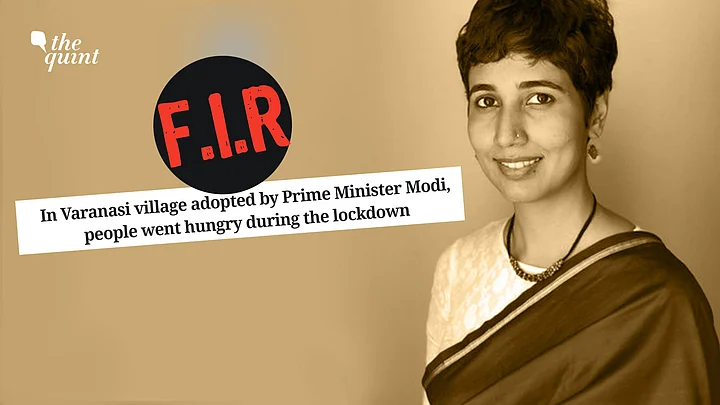The Varanasi Police has registered an FIR against Scroll.in's Executive Editor Supriya Sharma over an article written by the journalist on the condition faced by people in Domari, a village adopted by Prime Minister Narendra Modi in his parliamentary constituency.
The FIR has been registered under sections of the Indian Penal Code (IPC) and Section 3(1)(r) and 3(1)(d) of the Scheduled Castes/Scheduled Tribes (Prevention of Atrocities Act) 1989.
The complaint, on the basis of which the FIR was lodged, was filed by Mala Devi, one of the people quoted in the story. Devi has alleged that she was misquoted by the journalist as someone who had to go hungry during the coronavirus lockdown as she did not have access to food.
Devi, in her complaint, says that she told Sharma that she had no trouble getting food, the opposite of which was reported in the article. If this is indeed correct, this looks like it could be a possible case of defamation under Section 501 of the IPC (which is one of the charges in the FIR), the other offences under which the Varanasi Police registered the FIR raise a few questions.
Was Section 269 of IPC Required in Case of Such a Complaint?
One of the charges filed by the Varanasi Police in the FIR was Section 269 of the IPC.
This section applies to the following:
“Negligent act likely to spread infection of disease dangerous to life.—Whoever unlawfully or negligently does any act which is, and which he knows or has reason to believe to be, likely to spread the infection of any disease dangerous to life, shall be punished with imprisonment of either description for a term which may extend to six months, or with fine, or with both.”
But what in the article could lead to the likely spread of an infection or disease (presumably COVID-19)? Even the complaint by Mala Devi makes no claim about the article spreading misinformation about the disease, so there is no basis for this charge to have been included by the police.
This shows that the section has been unthinkingly slapped on just because the article is about the coronavirus lockdown.
Section 3(1) of the SC/ST Prevention Act
Section 3(1) of the SC/ST (Prevention of Atrocities) Act is a different matter. Under the Act, as it originally stood, there would be no applicable provision relevant to this case.
However, following amendments to the Act made in 2015, there are provisions which are potentially relevant – see the highlighted section of the image below:
The possibly relevant sub-sections under Section 3(1) are:
3(1)(r): intentionally insults or intimidates with an intent to humiliate a member of an SC/ST in any place within public view and,
3(1)(s): abuses a member of an SC/ST using caste name in any place within public view.
Since no caste name has been specified in the article, 3(1)(s) would not apply in the instant case, and the FIR has, thankfully, not been filed under this provision.
The FIR does, however, allege the possible commission of offences under Section 3(1)(r) and Section 3(1)(d) of the Act.
As Mala Devi has alleged that the article makes fun of her caste (“meri jaati ka mazaak udaya hai”), Section 3(1)(r) is a potentially relevant provision. Of course, as the wording of the provision makes, clear, for it to apply, there is a requirement of an intent to humiliate, which would be extremely difficult going just by the article.
However, the mention of Section 3(1)(d) is extremely bizarre. Here's what Section 3(1)(d) punishes:
“garlands with footwear or parades naked or semi-naked a member of a Scheduled Caste or Scheduled Tribe”
This, of course, makes no sense whatsoever, as Sharma has neither done this, nor has she written about anything of the sort. And applying this provision, or any apart from 3(1)(r), demonstrates a lack of application of mind by the police (much like the invocation of Section 269 of the IPC), which is an important legal ground for challenging orders by the police and judiciary.
Then Why Was the SC/ST Prevention Act Included?
So, what is the significance of invoking provisions of the SC/ST (Prevention of Atrocities) Act?
Why wasn't criminal defamation – where truth alone isn't a defence (you have to also show a public good) – enough here?
The key significance is that one can’t get anticipatory bail if accused under this act.
One might remember the furore in 2018, when the Supreme Court upheld the 2015 amendments, but said anticipatory bail could be granted if no prima facie case was made out. Amendments were passed by the Centre to nullify this, which were then upheld by the SC.
There is a logic to not granting anticipatory bail – to prevent 'no prima facie case' becoming a way for influential upper caste persons to get away because of who they are.
Whether that logic applies here, given all the background, is definitely up for debate.
(At The Quint, we question everything. Play an active role in shaping our journalism by becoming a member today.)
